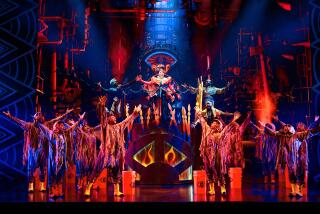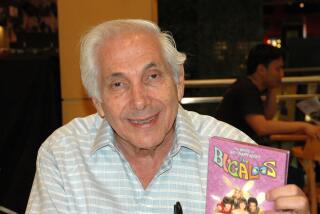Don Herbert, 89; TV’s ‘Mr. Wizard’ taught science to young baby boomers
- Share via
Don Herbert, who explained the wonderful world of science to millions of young baby boomers on television in the 1950s and ‘60s as “Mr. Wizard” and did the same for another generation of youngsters on the Nickelodeon cable TV channel in the 1980s, died Tuesday. He was 89.
Herbert died at his home in Bell Canyon after a long battle with multiple myeloma, said Tom Nikosey, Herbert’s son-in-law.
A low-key, avuncular presence who wore a tie and white dress shirt with the sleeves rolled up, Herbert launched his weekly half-hour science show for children on NBC in 1951.
Broadcast live from Chicago on Saturdays the first few years and then from New York City, “Watch Mr. Wizard” ran for 14 years.
Herbert used basic experiments to teach scientific principles to his TV audience via an in-studio guest boy or girl who assisted in the experiments.
“I was a grade school kid in the ‘50s and watched ‘Mr. Wizard’ Saturday mornings and was just glued to the television,” said Nikosey, president of Mr. Wizard Studios, which sells Herbert’s science books and TV shows on DVD.
“The show just heightened my curiosity about science and the way things worked,” Nikosey said. “I learned an awful lot from him, as did millions of other kids.”
By 1955, there were about 5,000 Mr. Wizard Science Clubs nationwide, with more than 100,000 members.
And as Mr. Wizard, Herbert was a true TV star, featured in an array of magazines, including TV Guide, Life, Time, Newsweek, Science Digest, Boy’s Life and even Glamour.
Herbert was taken aback by the show’s success.
“What really did it for us was the inclusion of a child,” he told the St. Louis Post-Dispatch in 2004. “When we started out, it was just me up there alone. That was too much like having a professor give a lecture. We cast a boy and girl to come in and talk with me about science. That’s when it took off.
“The children watching could identify with someone like them.”
In explaining how he brought a sense of wonder to elementary scientific experiments, Herbert told the New York Times in 2004 that he “would perform the trick, as it were, to hook the kids, and then explain the science later.
“We thought we needed it to seem like magic to hook the audience, but then we realized that viewers would be engaged with just a simple scientific question, like, why do birds fly and not humans? A lot of scientists criticized us for using the words ‘magic’ and ‘mystery’ in the show’s subtitle, but they came around eventually.”
“Watch Mr. Wizard” garnered numerous honors, including a Peabody Award, four Ohio State awards and the Thomas Alva Edison Foundation Award for “Best Science TV Program for Youth.”
And Herbert had a lasting effect.
“Over the years, Don has been personally responsible for more people going into the sciences than any other single person in this country,” George Tressel, a National Science Foundation official, said in 1989.
“I fully realize the number is virtually endless when I talk to scientists,” he said. “They all say that Mr. Wizard taught them to think.”
Herbert’s experiments on the show typically used household items.
As a 1951 Time magazine story noted: “Herbert’s object is to show his audience what goes on in the world — why the wind blows, what makes a cake rise, how water comes out of a kitchen tap.
“To explain rain, he boils water in a coffee pot, compares the steam to clouds, and shows how ‘rain’ will condense on the sides of a glass held over the spout.”
Not every Mr. Wizard experiment went according to plan.
In “Saturday Morning TV,” a 1981 book by Gary H. Grossman, Herbert recalled pouring two colorless solutions into one glass and then announced that the solution would turn black before he counted to nine.
“I got up to 20 and decided I’d better stop,” he recalled. “I explained that apparently other factors like temperature and acidity had interfered with the experiment.”
But as he finished his explanation, the liquid changed color.
“It was embarrassing, certainly, but I discovered the answer,” he said. “We hadn’t used a fresh solution, so the reaction was slower than expected.”
After “Watch Mr. Wizard” ended its 14-year-run in 1965, Herbert showed up frequently on talk shows, including “The Tonight Show” and “Late Night With David Letterman.”
“Watch Mr. Wizard” was revived in 1971 for a season, and “Mr. Wizard’s World” ran on Nickelodeon from 1983 to 1990.
Born July 10, 1917, in Waconia, Minn., Herbert later moved to Minneapolis and then La Crosse, Wis. He graduated from LaCrosse State Teachers College in 1940 and could have taught English or general science — his majors — but he recalled later that he was more interested in the theater.
He worked as an actor and stagehand in a Minnesota theater group before moving to New York City in 1941.
A year later, he volunteered for the Army Air Forces. As a B-24 bomber pilot, he flew 56 missions over Italy, Germany and Yugoslavia and received the Distinguished Flying Cross and the Air Medal with three oak-leaf clusters.
Herbert wrote several books, including “Mr. Wizard’s Supermarket Science” and “Mr. Wizard’s Experiments for Young Scientists.”
In recent years, he helped set up his website, https://www.mrwizardstudios.com .
He is survived by his wife of 34 years, Norma; his two sons and a daughter from his first marriage, Jay and Jeffrey and Jill Rogers; his stepdaughters Kendra Jeffcoat and Kris Nikosey; his stepson, Kim Kasell; and 13 grandchildren.
The family plans to hold a private memorial service.
dennis.mclellan@latimes.com
More to Read
Start your day right
Sign up for Essential California for the L.A. Times biggest news, features and recommendations in your inbox six days a week.
You may occasionally receive promotional content from the Los Angeles Times.






